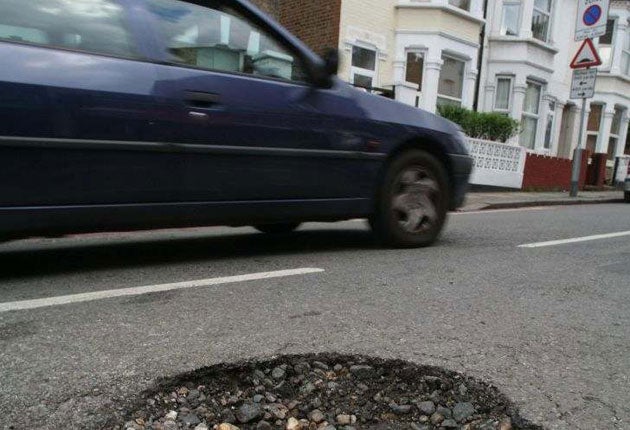Pothole 'every 120 yards' on Britain's roads
Highways would take 15 years to repair

Your support helps us to tell the story
From reproductive rights to climate change to Big Tech, The Independent is on the ground when the story is developing. Whether it's investigating the financials of Elon Musk's pro-Trump PAC or producing our latest documentary, 'The A Word', which shines a light on the American women fighting for reproductive rights, we know how important it is to parse out the facts from the messaging.
At such a critical moment in US history, we need reporters on the ground. Your donation allows us to keep sending journalists to speak to both sides of the story.
The Independent is trusted by Americans across the entire political spectrum. And unlike many other quality news outlets, we choose not to lock Americans out of our reporting and analysis with paywalls. We believe quality journalism should be available to everyone, paid for by those who can afford it.
Your support makes all the difference.Whether there are now enough holes to fill the Albert Hall might never be known, but the number plaguing British roads has soared by 32 per cent since last year and the average road now boasts a pothole every 120 yards.
A report reveals that the condition of bitumen under local authority care has deteriorated in most regions beyond the benchmark of 4,000 holes endured by Blackburn motorists in John Lennon's 1967 song, "A Day in the Life".
English councils filled 5,252 holes each on average last year but because of an £8.5bn funding shortfall it will take nearly 13 years at the present rate of maintenance to get them all patched up. In Wales, it will take 15.6 years before councils have repaired all the damage.
It costs £65 to fill one pothole, on average, and it would cost £47m per local authority to clear the problem. The annual Alarm report by the Asphalt Industry Alliance (AIA), which represents the road building industry, found eight out of 10 councils felt the state of disrepair was so severe that it posed a threat to drivers, cyclists and motorcyclists, and caused more emissions because of stop-start traffic conditions.
The AIA chairman, Mike Linley, said: "Free-flowing traffic on unobstructed roads is the most environmentally friendly and the safest. Yet with a road opening or pothole every 120 yards, free-flowing traffic seems like an impossible dream."
Motoring organisations said more heavy flooding combined with last winter's freeze meant the situation was likely to get worse. The AA said the state of the roads had contributed to the number of insurance claims tripling.
The AA president, Edmund King, said 2,000 drivers had contacted the organisation in February because of pothole damage – nearly three times as many as the previous year. He said the Government invested only 20 per cent of the £46bn it received each year from the road tax back into roads and called for a building programme focused on roads to kick start the economy.
"Now is the time to follow Barack Obama's example and pump in the cash to restore UK roads, create jobs during the recession and help prevent cash-strapped local authorities haemorrhaging more public money. We need to break out of this vicious cycle of decline on our roads," said Mr King.
The growing number of utility trenches is also contributing to roads deterioation as they often lead to potholes. The number of trenches in each English local authority area averaged 13,212, while the figure for Wales was 4,613.
Join our commenting forum
Join thought-provoking conversations, follow other Independent readers and see their replies
Comments